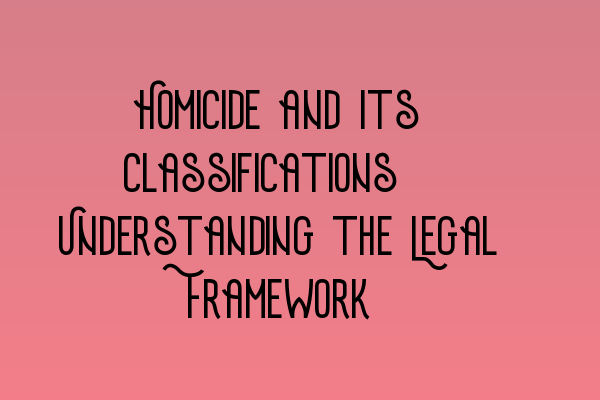Homicide and Its Classifications: Understanding the Legal Framework
Introduction
Homicide, the act of one human being causing the death of another, is a serious crime with severe legal consequences. It is essential to understand the legal framework surrounding homicide to navigate the complexities of criminal law cases effectively. In this blog post, we will delve into the various classifications of homicide and provide a comprehensive understanding of the subject matter.
Homicide Classifications
Homicide can be classified into different categories based on the intent, level of culpability, and circumstances surrounding the incident. The primary classifications include:
1. Murder
Murder is the most serious form of homicide and involves the deliberate act of causing another person’s death with malice aforethought. This means that the perpetrator has the intent to kill or cause grievous bodily harm to the victim. Murder charges carry severe penalties, including lengthy prison sentences or, in some cases, life imprisonment.
2. Manslaughter
Manslaughter refers to the unlawful killing of another person without malice aforethought. It can be further classified into voluntary manslaughter and involuntary manslaughter.
Voluntary manslaughter occurs when a person intentionally kills another in the heat of the moment, often due to provocation or in the belief of acting in self-defense. Involuntary manslaughter, on the other hand, involves unintentional killing resulting from reckless or negligent behavior.
3. Infanticide
Infanticide is a specific type of homicide that involves the killing of a newborn baby by its mother. It is crucial to note that infanticide is treated differently under the law due to the complex psychological and emotional factors involved. The offender may receive a less severe penalty than in cases of murder or manslaughter.
4. Justifiable Homicide
Justifiable homicide refers to cases where the killing of another person is deemed legally and morally acceptable. It typically occurs in situations of self-defense or defense of others, where there is a reasonable belief of imminent danger or threat to life. The law recognizes the right to protect oneself or others from harm.
Legal Implications and Defenses
Homicide cases involve complex legal implications and potential defenses. Understanding the specific classification of the offense is crucial in determining the applicable laws, penalties, and available legal strategies. Defense options may include self-defense, temporary insanity, or lack of intent.
Conclusion
Homicide, with its various classifications, represents a critical aspect of criminal law. Familiarizing oneself with the legal framework surrounding homicide is essential for both legal practitioners and the general public. If you require legal representation or advice regarding homicide cases, it is vital to consult an experienced criminal defense lawyer who can guide you through the intricacies of the legal system.
